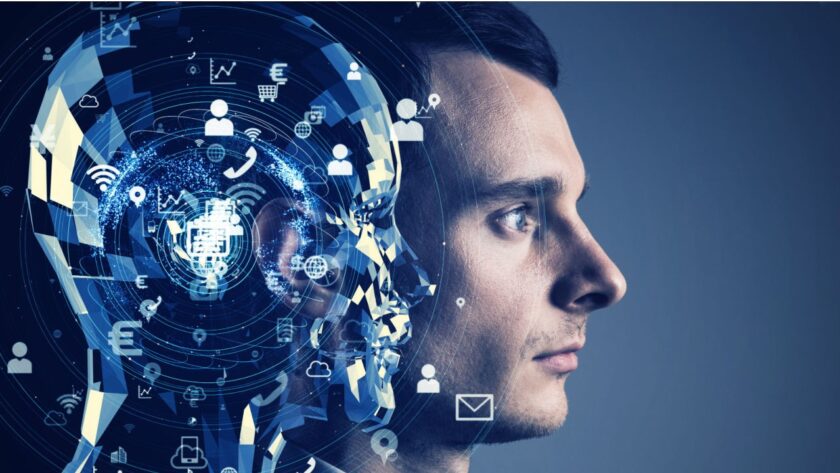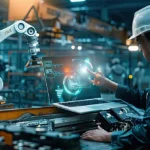Artificial Intelligence (AI) is rapidly becoming a central part of technological evolution. Over the past few decades, AI has transformed from a theoretical concept into a practical tool that is reshaping industries, creating new opportunities, and addressing complex challenges. With advancements in machine learning, neural networks, and deep learning, AI is helping to solve problems that were once unimaginable, giving us insight into a future where technology works smarter, not harder.
As AI continues to develop and become integrated into various sectors, it is playing an increasingly pivotal role in shaping the future of technology. But what exactly does this mean? How is AI changing industries, the way we interact with machines, and even the fabric of human society?
In this article, we’ll explore how AI is shaping the future of technology, with insights into the areas it is transforming, its impact on different industries, and the possibilities it opens up for the next generation of technological innovation.
1. AI in Automation and Efficiency
One of the most significant ways AI is shaping the future of technology is through automation. Machine learning algorithms and intelligent systems are enabling machines to perform tasks that were once handled exclusively by humans. From simple tasks like data entry to complex processes in manufacturing and logistics, AI is enabling businesses to improve efficiency and reduce human error.
For example, in the manufacturing industry, AI-powered robots are now being used to perform repetitive tasks, such as assembling products, packaging, and quality control. These robots are more precise, consistent, and efficient than their human counterparts, allowing companies to boost productivity while reducing operational costs. Moreover, AI is being used to optimize supply chains, predict equipment failures, and streamline maintenance schedules, further enhancing efficiency in industries worldwide.
2. AI in Personalization and Customer Experience
AI is revolutionizing customer interactions by enabling personalized experiences on a scale previously thought impossible. In industries like retail, e-commerce, and entertainment, AI algorithms analyze vast amounts of data to predict consumer preferences, recommend products, and tailor content to individual needs.
For example, online retailers like Amazon use AI to provide personalized product recommendations based on a user’s browsing and purchase history. Similarly, streaming services like Netflix rely on AI to analyze viewing habits and recommend movies or TV shows to users. These personalized experiences not only enhance customer satisfaction but also drive engagement and sales.
The future of AI in personalization extends beyond simple recommendations. With advancements in natural language processing (NLP) and sentiment analysis, AI systems are now capable of understanding and responding to customer queries in a more human-like manner, further improving the customer experience.
3. AI in Healthcare and Medicine
The healthcare sector is another area where AI is making a profound impact. From diagnostics to personalized treatment plans, AI is transforming the way we approach healthcare.
AI-driven algorithms are being used to analyze medical images, such as X-rays, MRIs, and CT scans, to detect early signs of diseases like cancer, heart disease, and neurological disorders. These algorithms can sometimes detect abnormalities that even experienced radiologists might miss, leading to earlier diagnosis and improved patient outcomes.
In addition, AI is enabling the development of personalized medicine. By analyzing a patient’s genetic makeup, medical history, and lifestyle data, AI can help doctors create tailored treatment plans that maximize the chances of success. AI is also helping researchers develop new drugs faster by predicting how certain compounds might interact with the human body, reducing the time and cost associated with clinical trials.
4. AI in Autonomous Systems
Autonomous vehicles, drones, and robots are all powered by AI technologies, and they represent one of the most exciting areas of innovation. Autonomous cars, for example, are equipped with AI systems that process data from sensors, cameras, and radar to make real-time driving decisions. These vehicles are capable of navigating complex environments without human intervention, making transportation safer and more efficient.
Drones are also benefiting from AI, particularly in industries like agriculture, delivery, and logistics. AI-powered drones can monitor crops, deliver packages, and carry out inspections in hard-to-reach areas, all while reducing the need for human labor.
The future of autonomous systems lies in their continued integration with AI, enabling more sophisticated capabilities, such as fully autonomous cities, advanced air traffic control systems, and even AI-driven healthcare systems that can respond to emergencies in real-time.
5. AI in Data Analysis and Decision-Making
One of the most powerful ways AI is shaping technology is through its ability to analyze vast amounts of data. Data is at the heart of almost every industry, from finance to healthcare, and AI is unlocking new insights that were once out of reach.
AI-powered data analysis tools can sift through massive datasets, identify patterns, and generate predictive models that assist businesses in making more informed decisions. In finance, for example, AI is used to detect fraudulent activity by analyzing transaction data in real time. In healthcare, AI can predict outbreaks of diseases based on historical data and trends.
AI is also playing a role in decision-making processes within organizations. By providing real-time insights, predictive analytics, and automated reports, AI enables leaders to make quicker, data-driven decisions, which is essential in today’s fast-paced business environment.
6. AI in Natural Language Processing and Communication
Natural language processing (NLP) has made significant strides in recent years, and AI is playing a key role in how we interact with technology. NLP allows machines to understand, interpret, and generate human language, enabling more intuitive communication between people and devices.
Voice assistants like Amazon’s Alexa, Apple’s Siri, and Google Assistant are powered by AI and NLP, allowing users to interact with their devices using natural language commands. These voice assistants are becoming increasingly sophisticated, enabling users to perform tasks such as setting reminders, controlling smart home devices, and answering questions with greater accuracy.
NLP is also improving communication in customer service. AI chatbots are now used by businesses to provide 24/7 support, answer frequently asked questions, and even resolve simple issues. As NLP technology continues to evolve, we can expect even more seamless interactions between humans and machines.
7. AI in Cybersecurity
As cyber threats continue to evolve, AI is becoming an essential tool for protecting data and systems. AI-powered cybersecurity tools are capable of analyzing network traffic, identifying unusual behavior, and detecting potential threats in real time.
For example, AI can help identify phishing attacks, malware, and other security risks by analyzing patterns in data and comparing them with known threats. Machine learning algorithms can also adapt and evolve to recognize new and emerging threats, providing businesses with a more dynamic and proactive approach to cybersecurity.
The future of AI in cybersecurity will likely involve more sophisticated systems capable of defending against advanced persistent threats, securing critical infrastructure, and responding to attacks in real time.
Frequently Asked Questions (FAQs)
- How does AI affect job markets and employment? AI can automate many tasks, potentially reducing the demand for certain jobs. However, it also creates new job opportunities in fields such as AI development, data analysis, and cybersecurity. The key is to reskill and adapt to new technologies.
- Is AI safe to use in critical areas like healthcare? Yes, AI can be safe when used properly, but it requires strict oversight, testing, and validation to ensure its reliability and safety, particularly in critical areas like healthcare.
- Can AI make decisions on its own without human input? AI systems can make decisions based on data and algorithms, but human oversight is still essential in many areas to ensure ethical considerations, accountability, and accuracy.
- How does AI learn from data? AI learns through machine learning algorithms, which allow it to recognize patterns, make predictions, and improve its performance based on new data over time.
- What are the main ethical concerns with AI? Ethical concerns with AI include issues like bias in algorithms, data privacy, job displacement, and the potential misuse of AI for harmful purposes.
- Will AI replace human creativity? AI can assist in creative processes, but human creativity, intuition, and emotional intelligence remain irreplaceable. AI can enhance creative endeavors but not fully replace them.
- How can AI help in addressing global challenges? AI can address global challenges like climate change, healthcare accessibility, and poverty by providing data-driven insights, improving resource allocation, and enhancing decision-making.
Conclusion
AI is playing a fundamental role in shaping the future of technology, with profound implications for various industries and society as a whole. From revolutionizing healthcare and enabling automation to enhancing customer experiences and strengthening cybersecurity, AI is unlocking new opportunities for progress. The future holds vast potential, as AI continues to evolve, integrate with other technologies, and redefine how we live and work.
However, as AI continues to develop, it’s essential to consider the ethical, societal, and economic implications it brings. The challenge will be ensuring that AI is used responsibly and for the greater good, while also preparing the workforce for the changes it will bring.
Key Takeaways:
- AI drives efficiency by automating processes, reducing errors, and improving productivity across various industries.
- Personalization powered by AI is enhancing customer experiences and engagement in sectors like retail, e-commerce, and entertainment.
- AI in healthcare is improving diagnosis accuracy, personalizing treatment plans, and accelerating drug development.
- AI is enabling autonomous systems, such as self-driving cars and drones, which are transforming industries like transportation and logistics.
- AI in data analysis is revolutionizing decision-making, providing businesses and organizations with valuable insights to drive growth and innovation.
- The future of AI is intertwined with its ability to solve complex global challenges, from climate change to healthcare and beyond.




